Gathering Storm Over Syria
August 28, 2013 at 2:07 pm | Posted in Arms Control, Human Rights, International Relations, World Politics | 1 CommentTags: Arms Control, Human Rights, Iran, Iraq, Israel, Kurds, Middle East, Russia, Syria, United Kingdom, United Nations, United States
Grotesque images of children foaming at the mouth as they lay dying from an apparent chemical weapons attack in the eastern suburbs of Damascus on 21 August 2013 was, in the words of US Secretary of State John Kerry, a “moral obscenity.” Medecins Sans Frontieres (MSF) reports that the three hospitals it supports in Damascus treated 3,600 patients with symptoms of poisoning and 355 of them have died. While Kerry and his counterparts in Britain, France, Turkey, and Saudi Arabia have been quick to blame the attack on the Bashar al-Assad regime they have not yet produced any evidence linking the regime to the attacks. MSF reports that while there are strong indications that thousands of patients were exposed to a neurotoxic agent, they “can neither scientifically confirm the cause of these symptoms nor establish who is responsible for the attack.”

Indeed, the timing of the attack—on the one year anniversary of President Barack Obama’s warning to the Assad government that the use of chemical weapons against their adversaries would cross his “red line”—is suspicious. The regime, by all accounts, was pushing back the rebels. Why would it now invite retribution from the West? We don’t know what chemicals were used or even who gave the order to launch the chemical weapons. Even if the attack was launched by Syrian government forces, is it possible that it was by a mid-level officer fearful of failure—not because the regime has qualms killing its own people, but because it is not mad enough to invite a hail of missiles?
Washington initially balked at the UN inspectors going to investigate the attack and then when they eventually commenced their inquiry, the White House claimed that the evidence will necessarily be tainted since it was already five days after the attack. Yet, scientists have found the unique chemical signature of sarin in a Kurdish village 4 years after Iraqi warplanes dropped cluster bombs according to a New York Times report and the UN investigators are confident of finding evidence if there are any. Long years of experience have given investigators sophisticated techniques to decipher the use of chemical weapons long after the fact. Tellingly, Syrian Foreign Minister Walid al-Muallem told reporters that the UN asked permission to access the sites of the alleged chemical attacks only on Saturday 24 August and permission was granted the next day! This does not qualify as stalling by any standard. While the investigators have no mandate to determine who was culpable, the fact that their convoy, when escorted by Syrian government forces, was shot at and had to retreat temporarily is also suspicious. Why should the government shoot its own military escorts?

The US and UK governments claim to have incontrovertible evidence that the Assad regime was responsible for the attacks but no such evidence has been presented and journalists do not press them to reveal this secret evidence. As Noam Chomsky noted many years ago, “The smart way to keep people passive and obedient is to strictly limit the spectrum of acceptable opinion, but allow very lively debate within that spectrum.” Thus, mainstream media in the US or the UK have not conducted interviews with Syrian government officials—except for a few cameo quotes which are then obscured by long interviews with administration spokesmen—or even the UN inspectors on the ground.
No mention has been made in the mainstream media that Carla Del Ponte, a member of the UN Independent Commission of Inquiry on Syria reported in May 2013 that testimony from medical personnel indicated “strongly but not incontrovertibly” that rebel forces were using the nerve agent sarin. In fact, the New York Times edited its online article on the alleged use of chemical weapons 22 times on Monday August 26, mainly to shore up support for the administration’s position. And after the Bush White House assurances of weapons of mass destruction in Iraq 10 years ago, claims by the Obama White House of chemical attacks by the Assad regime without any evidence to back it up is equally suspect.

In fact, as veteran journalist Gwynne Dyer notes, if we apply the time-honored test of who benefited from the chemical attack—the only likely answer are one of the many rebel factions knowing that their use will bring retribution on Assad. Indeed, the focus on chemical weapons attack also detracts from the atrocities of the rebels—notably the ethnic cleansing of Kurds in the north-east forcing 40,000 of them to flee to northern Iraq in the biggest refugee exodus of the Syrian civil war. In all the moral fury marshaled by US and UK administrations there is nary a word about this outrage!
What is also remarkable is that left-liberal opinion in the United States is so overjoyed that Obama is not Bush that they do not hold him to the same standards of scrutiny to which they have held other presidents. No large anti-war protests are planned when the US has already stationed four ships and some submarines capable of firing cruise missiles at Syria in the eastern Mediterranean and Prime Minister David Cameron has called back parliament to debate a punitive strike on Syria.

Then again there is the question of legal justification. As it is clear that there will be no mandate from the United Nations Security Council for a punitive strike on Syria since Russia is irremediably opposed to it, justifications are trotted out on what William Hague, the UK Foreign Secretary said was “a great humanitarian need and distress” and claimed that it is based on “international law.” It is not clear though which “international law” was being invoked. If it was the international convention on the non-use of chemical and biological weapons, three major states in the Middle East–Egypt, Israel, and Syria–have not ratified it. So Syria is being asked to adhere to a treaty it has not signed—an excellent legal precedent!
US forces have admitted dropping white phosphorus over Fallujah in 2004 and Britain and the United States had supplied chemicals and weapon-making equipment in the 1980s to Saddam Hussein for his war against Iran. But of course, in true imperialist hubris, the laws they impose on others do not apply to themselves.
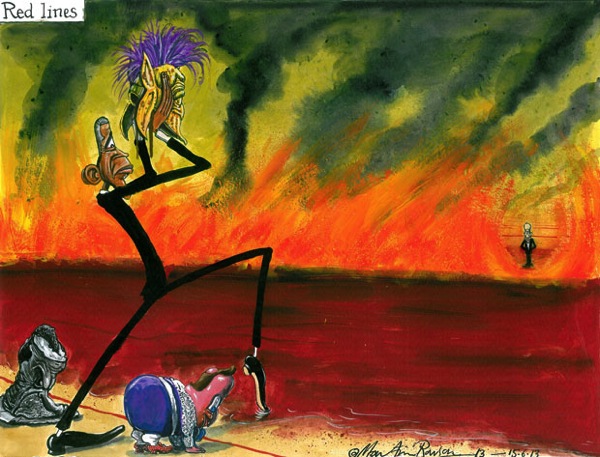
Not only is there no compelling evidence that the Syrian government had deployed chemical weapons and no legal basis exists for attacking the country, but options to attack are so marginal that they are merely a pointless punitive strike. Israel has attacked Syria with missiles several times without causing any real change in the Assad government’s behavior and it is unclear what more can be expected from a US-led NATO strike. Clearly Syria’s chemical weapons cannot be targeted as that would cause unimaginable casualties. Syrian government, anticipating an attack would already have reconfigured its command-and-control operations so they do not present an easy target. It is only those command-and-control positions that are not easily moveable which could be attacked and these may cause large civilian casualties as well. Military airfields could be cratered and aircraft bombed and this may hurt the Assad regime in the short run. Even the Chairman of the US Joint Chiefs of Staff, General Martin Dempsey, has admitted that less than 10 percent of the casualties in the two and a half years of civil war in Syria are accounted by bombs.
The conclusion is inescapable: any attack on Syria is simply to counter domestic opponents who claim that the Obama is weak. His Republican nemesis, John McCain and his allies have been hunkering for a more muscular American response to Syria even though it would raise military spending and further complicate the budgetary situation in Washington. But Obama can now become a ‘war president.’ For that, many Syrians will die a senseless death.
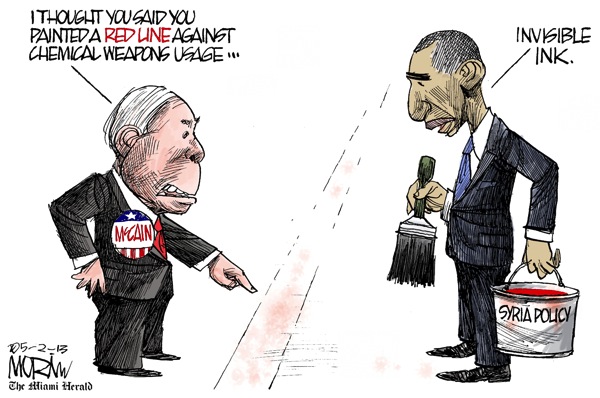
Even worse, launching missile strikes against the Assad regime will complicate the current moribund peace talks which are the only way to resolve the crisis. Here, too the US is torpedoing efforts to bring the warring parties together by insisting that Syria’s close ally, Iran, be excluded from it. There are so many rebel factions—some 1,200 different military units by Patrick Cockburn’s count ranging from small family outfits to large organized units with tanks and artillery—that they cannot even agree on a delegation to represent them. It is as he says “a failed country and a failed opposition.”
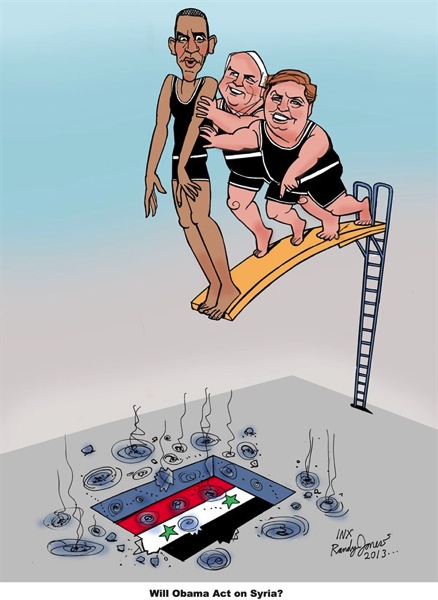
This is not a situation that calls for surgical air strikes. If the Obama administration really wants to bring peace, it needs to cooperate with Russia and get their regional allies to sit together at a conference table after agreeing to a cease fire.
A Fog of Myths About North Korea
April 29, 2013 at 1:59 pm | Posted in Arms Control, Capitalism, Human Rights, International Relations, Nuclear Non-Proliferation, Political Economy, World Politics | Leave a commentTags: China, East Asia, India, interstate system, Israel, Japan, North Korea, Pakistan, South Korea, the Philippines, United Nations, United States, US hegemony, Vietnam
Rarely has the manufacturing of consent in the mainstream media been as thorough as it has been in the case of North Korea. It is the original ‘hermit kingdom,’ isolated from the outside world by a dynasty of communist dictators–a ‘socialism in one family’–and irrational to the extent of threatening Washington with a nuclear Armageddon. This reigning consensus is so widespread that there has been little challenge to it in the major news outlets of the world and yet, a moment’s reflection suggests that there are many flaws in this narrative.
In the first instance, in a rare piece of insight into North Korea, a former Western intelligence officer who writes under the pseudonym of James Church has argued that since isolationism is a two-way street, the rest of the world is even more ignorant about North Korea than Pyongyang is about the wider world. After all, North Korean officials can monitor radio and television broadcasts, plug into the Internet, and analyse books and magazines from the outside world. They know what people outside their borders are thinking and doing. But people outside North Korea have little insight into what goes on in the country and are metaphorically reduced to examining the entrails of sacrificial animals to divine Pyongyang’s intentions.
Hence, Church writes, “We…have developed a fog of myths about them as a substitute for knowledge. These myths, handed down from administration to administration, are comforting in their long familiar ring, but make it difficult for us to avoid walking in circles. The North Koreans move nimbly through this fog” like small boats deftly weaving in and out between lumbering vessels.
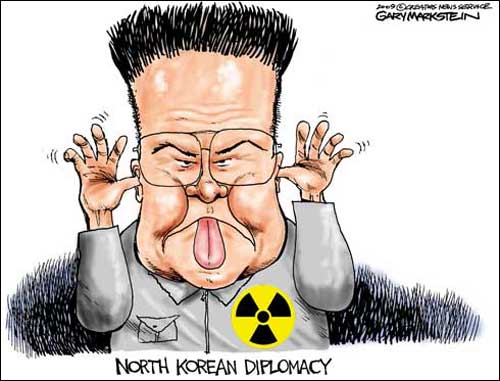
Rather than nuclear weapons, Church argues, North Korea’s greatest strength is the capacity to behave badly: by carefully choosing the right time, it knows its actions will force big powers to pay close attention even though they may grind their teeth. What it fears most is being swept aside in big power politics, so by playing its weak hand cleverly, it seeks dialogue with the United States, a process that was derailed when former president George W. Bush labelled it part of an “axis of evil.”
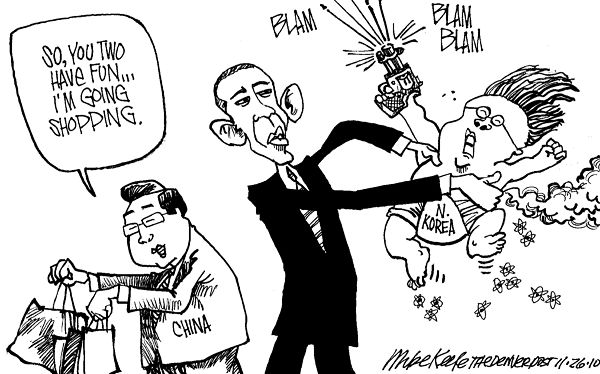
Recent concerns about Pyongyang’s nuclear program stemmed from an underground nuclear test on February 12, 2013—its third in seven years. In response, the United States and its allies pressed the UN Security Council to add new sanctions on the country: enhanced scrutiny over shipments and air cargo, a ban on the sale of luxury goods, expanded restrictions on a range of institutions and senior officials. China, notably, signed on to these sanctions and did not veto them.
If China is dragging its feet on the issue of North Korea, it is also because Beijing has a stake in the survival of the Kim Jong-eun regime. The collapse of North Korea could bring a stream of refugees to China which already has 2 million ethnic Koreans and threaten the stability of the border region. Moreover, since a unified Korea is likely to be led by Seoul, it raises the possibility of US forces on China’s border with Korea. A unified Korea with some 70 million people would also become a formidable economic competitor and transform the dynamics of the regional economy as Timothy Beardson writes in the Financial Times.
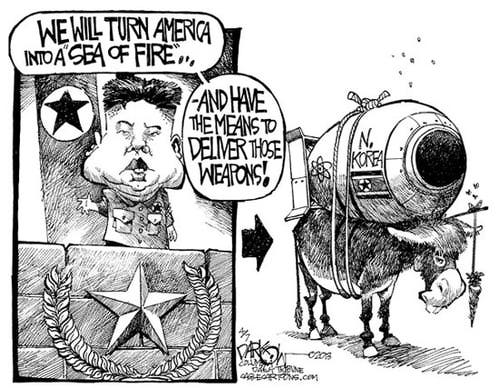
When President Barack Obama acknowledges that North Korea does not have a single deployable nuclear warhead, and according to SIPRI, the five permanent members of the Security Council—all declared nuclear powers—had approximately 19,265 as of January 1, 2012, this response to Pyongyang’s third nuclear test seems disproportionate. This is all the more so since North Korea has withdrawn from the nuclear Non-Proliferation Treaty and the other states outside the NPT—India, Israel, and Pakistan—are not treated in the same way as Pyongyang. As Jonathan Steele writes in the Guardian, “If it is offensive for North Korea to talk of launching a nuclear strike against the United States (a threat that is empty because the country has no system to deliver the few nuclear weapons it has), how is it less offensive for the US to warn Iran that it will be bombed if it fails to stop its nuclear research?”
In response, statements in the official newspaper of the ruling Workers’ Party of Korea (WPK), Rodong Simun, on March 6, 2013 declared that if the US continues to threaten it with nuclear weapons, Pyongyang now had the ability to turn Seoul and Washington into “a sea of fire.” North Korea also repudiated the 1953 Korean War ceasefire and cut the Red Cross hotline though lines between military and aviation authorities across the 38th parallel remain open.
Notably, till the middle of March, its foreign office maintained that it will abandon its nuclear weapons program if the United States removes its nuclear threats and abandons its hostile posture.
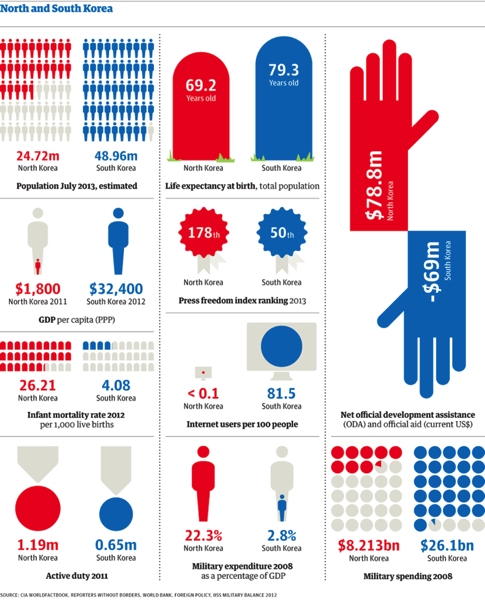
In reply, as Peter Hayes and Roger Cavazos of San Francisco’s Nautilus Institute note, on March 25 the United States flew B-52 Stratofortress stealth bombers over South Korea in military exercises that stimulated a nuclear attack on North Korea. Not only did these military exercises stir deep memories in North Korea where air raids killed an estimated 20 per cent of the population during the Korean War but the B-52 flights at the same time demonstrated China’s inability to affect US mobilization. The United States also bolstered its anti-missile batteries in Alaska and the West Coast.
Should it then surprise us that the North Korean ruling party’s Central Committee Plenum meeting set a ‘new strategic line’ of simultaneously pursuing the path of economic construction and “building nuclear armed forces”? It also announced that it would resume uranium enrichment at the Yongbyon reactor plant that had been moth-balled in October 2007 as a part of the denuclearization process.
Nevertheless, the WPK’s Central Committee Plenum ended by also declaring that “As a responsible nuclear weapons state, the DPRK [Democratic People’s Republic of Korea] will make positive efforts to prevent the nuclear proliferation, ensure peace and security in Asia and the rest of the world and realize the denuclearization of the world.”
In a state born of guerrilla struggle, leadership requires as Hayes and Cavazos suggest, endless battles and if Kim’s leadership itself is not under threat, he needs to embellish his own credentials. Hence, his belligerence is intended as a professor of Sociology at Seoul National University also suggests, as a manoeuvre to outflank the military while preparing the ground to initiate a more pragmatic economic policy. Thus amid the rattling of nuclear sabres, Kim has appointed as his premier, Pak Pong-ju a pragmatic economist who had been forced out of office in 2007 by the military, reportedly because he followed Chinese suggestions on economic reforms too closely.
North Korea does not have enough resources to build its economy and to maintain the world’s third largest conventional armed force. Unlike China when it started its reform process in the late 1970s, Pyongyang does not have a huge reserve labor force in agriculture. Its economy is sustained only by extensive food and oil imports from China. To successfully pursue economic growth, a nuclear deterrent will enable Kim to divert labor from his conventional military and hence the ‘new strategic line’ announced by the WPK’s Central Committee Plenum—to simultaneously work at both economic construction and ‘building nuclear armed forces.’
However, by promising not to export nuclear weapons or material, Kim signals that he has no intention of crossing red lines. Indeed, during the recent visit to North Korea by US basketball star Denis Rodman, Kim asked him to tell President Obama to phone him. The American president pointedly refused to accept this invitation in an interview with George Stephanopoulos.

Again, in an unusual move, North Korea’s ambassador to the United Kingdom, Hyon Hak-bong addressed the Communist Party of Great Britain (Marxist-Leninist) and asserted that North Korea’s only interest was its legitimate self-defence. While North Korean ambassadors have attended meetings of fraternal associations in the past, it has usually been to accept messages of appreciation or praise—not usually to make statements. What better way to signal Pyongyang’s intentions to negotiate than for its ambassador to make a statement in a European capital?
All US Secretary of State, John Kerry, would offer in return was an offer to talk if North Korea offered unspecified concessions to show its good faith. Faced with US and South Korean intransigence, North Korea effectively closed the Kaesŏng Indusrial Park—a special industrial region—where 123 South Korean companies had been employing 53,000 North Korean workers and directly paying Pyongyang $90 million in wages every year. Significantly, while this is a serious loss to the Kim regime, it is also a non-military response to what the regime sees as persistent US provocation.
While the military was suspicious of Kaesŏng, viewing it as a Trojan horse, the regime’s decision to close it (perhaps temporarily) may indicate that it is trying to show that it is willing to bear a significant cost to send a message that it is serious in its stance.
This should be seen in the light of the fact that the government has turned a blind eye to the growth of a market activities in the country which, Andrei Lankov, a Russian specialist on Korea estimates provides 75 per cent of the income of the people outside the military and the upper echelons of the party. Frequent travel to China and the availability of DVDs about South Korea have opened their eyes to new possibilities offered by consumerism.
This makes it all the more important for the regime to compel its adversaries to change their policies, to secure a peace agreement, to denuclearize the peninsula, and to get reparations from the Japanese who colonized the country from 1895 to 1945. This has been the aim of the regime for 60 years but has assumed a new urgency. A peace treaty is a sign that Pyongyang needs to show that the United States and its friends that grotesquely masquerade as “the international community” accepts it as a legitimate state.
Afghanistan, Pakistan and the Intolerable US Arrogance
May 22, 2012 at 10:31 am | Posted in Arms Control, Human Rights, International Relations | Leave a commentTags: Afghanistan, Central Asia, Human Rights, international relations, interstate system, military, NATO, Pakistan, Russia, United States, US hegemony, US politics, world politics
By what arrogance does NATO invite a head of state to a meeting and then have the head of state of the host nation refuse the visiting dignitary a one-on-one meeting even as his rival is granted an audience and then expect the snubbed leader to obsequiously accede to all demands even as drone aircraft murders the leader’s citizens and even troops with impunity? Yet, this is what President Barack Obama did to Pakistan’s Asif Ali Zardari who was summoned to the NATO conclave in Chicago at the very last minute. When it became apparent that a mere invitation was not going to make him cave in, he was refused a meeting with the US President who nevertheless met with the Zardari’s rival, the Afghan president Hamid Karzai thus humiliating Zardari. When aides scrambled to get the two presidents to “accidentally bump” into each other at the meeting, Obama pointedly told a press conference that that was their only exchange.

Last November, a strike by a US drone aircraft killed 24 Pakistani soldiers. The United States has refused to apologize for the murders even though it has acknowledged that its drone aircraft was responsible for the deaths. Consider the situation. The US needs Pakistan as an ally–granted that it is a cantankerous and difficult one. Surely, the best way to further alienate its citizens is to indiscriminately kill them by drone planes controlled from bases deep inside the US. The victims have little warning of their impending death–and the controllers of the planes do not put themselves in harm’s way at all. This is blood sport for them without risk–and when innocent civilians or Pakistani soldiers, the very ones the US depends on to stop al-Qaeda and Taliban fighters, are killed, President Obama refuses to apologize!
Given rising anger in Pakistan, the government shut down two key supply routes for the NATO troops in Afghanistan, forcing the North Atlantic alliance to use more circuitous routes through Central Asia and Russia. Again, snubbing President Zardari, the US Secretary of Defense, Leon Panetta, lauded the help and support of Kazakhstan, the Kyrgyz Republic, Tajikistan, Turkmenistan, and Uzbekistan–pointedly ignoring Pakistan. It is true that Pakistan has demanded a 20-times hike of the transit fee for trucks–for $250 to $5000. But this could have been negotiated if an apology was forthcoming.

Without the supply routes from Pakistan, the withdrawal of equipment brought into Afghanistan for more than a decade will be immensely complicated and the chances of lethal weaponry falling into the hands of the Taliban, al-Qaeda, and other militant groups increases geometrically. It would be another nail in the coffin of the US-NATO failure in Afghanistan. After more than 10 years of war, it is unlikely that the Karzai government will survive even for the three years the Soviet supported regime survived before being toppled–and it was toppled not because the insurgents’ military successes but because Moscow stopped deliveries of arms, fuel, and other supplies. As Juan Garriges writes for the Barcelona Centre for International Affairs, the likelihood of a civil war after NATO leaves is steadily increasing.
As Jonathan Steele writes in the Guardian, unlike the Soviets, NATO is not negotiating with the Taliban but is pursuing a garrison strategy that is virtually guaranteed to fail:
Increasing numbers of Afghan troops will sit in bases and go out on patrols instead of US and British ones, but this is nothing more than “Nato with an Afghan face”. Locals see these Afghan troops as occupiers just like the US and British. Less than 4% of the Afghan National Army are southern Pashtuns. Most are Tajiks and Uzbeks who speak a different language and don’t know the area. But if you recruit more southerners in a hurry, you just feed the Taliban’s latest tactic: join the Afghan army and police, get trained by the Americans and British, then shoot them in the camp or mess hall.
In these conditions, to continue to snub Zardari and refuse to apologize for the killing of the soldiers–perhaps for domestic electoral purposes as Obama’s likely Republican opponent, Mitt Romney, will certainly exploit it–is almost to ensure that the Pakistani Inter-Services Intelligence directorate (ISI) will increase its interference in Afghanistan especially since there is little love lost between the Karzai administration and the Pakistani military and political establishment.
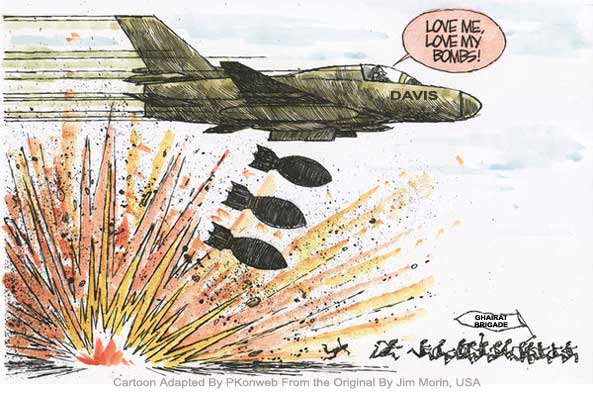
Finally, in NATO’s haste to cover its failure there is nary a word on the condition of Afghan women–sure to regress to the state they were in at the time of the 2001 invasion! The US-led invasion may have temporarily ousted the Taliban from Kabul and eventually killed Osama bin Laden in Abbottabad, but it has also devastated Afghanistan, killed tens (if not hundreds) of thousands of Afghans and thousands of Pakistanis, further destabilized Pakistan, fuelled the spread of al-Qaeda and other Islamic fundamentalists to Iraq, the Arabian peninsula, and east Africa, and expended trillions of dollars when the world-economy is mired in a crisis like no other since the Great Depression, and to the loss of thousands of American lives as well. Constitutional liberties have been suspended and torture has been reintroduced as a matter of state policy. The man who campaigned to change all this has done nothing at all!
The Greek Challenge: Austerity or NATO
May 9, 2012 at 4:16 pm | Posted in Arms Control, Capitalism, democracy, International Relations, Political Economy, World Politics | 1 CommentTags: European Union, Eurozone, France, Greece, Internnational Monetary Fund, NATO
In the Greek elections on Sunday May 6, 2012, the two main parties that had governed the country since the end of the dictatorship–New Democracy and Pasok–and both of which has subscribed to the stringent austerity measures imposed on Athens for a bailout suffered a stunning set-back. Used to dominating the polls, together they received just one-third of the votes. Two-thirds of the Greek electorate voted for parties–including a neo-Nazi party, Golden Dawn–that rejected the austerity measures, though most Greeks still want to remain within the Eurozone. Alexis Tsipras, the leader of the Syriza coalition of green and left parties that placed second in the elections, and was the big winner declared the austerity plan dead. That is certainly what the Greek voters indicated though the German Chancellor, Angela Merkel and the European Commission President, José Manuel Durão Barroso claimed that agreements are binding and cannot be negotiated after every election. By what perverted logic does this hold: last year, when the stringent bailout conditions were imposed on Greece by the ‘troika’–the European Union, the European Central Bank, and the International Monetary Fund–the then Greek Prime Minister Giorgios Papandreou wanted to hold a referendum. Merkel and French President Nicolas Sarkozy, forced him to rescind the referendum. The bailout agreement, then, was foisted on the Greek people not only without their consent, but on the explicit condition that their consent not be solicited. No such international agreement can have a shred of legitimacy and the Greeks voted, in their millions, to reject it!
 It was, Albert Einstein I think who said that the clearest sign of insanity is to persist in doing something that has failed repeatedly. Clearly, austerity programs have not worked. In Greece, unemployment stands at 21 per cent and the OECD estimates that real wages have fallen by 25 per cent in the last two years.According to the IMF, this will be the fifth straight year of recession for Greece to be followed by a year of stagnation. Even if the Greek government were to implement the austerity measures, the IMF estimates that in 2017, the public debt to GDP ratio would be 137 per cent, higher than at the onset of the current crisis. And thus far, IMF projections have been overly optimistic!
It was, Albert Einstein I think who said that the clearest sign of insanity is to persist in doing something that has failed repeatedly. Clearly, austerity programs have not worked. In Greece, unemployment stands at 21 per cent and the OECD estimates that real wages have fallen by 25 per cent in the last two years.According to the IMF, this will be the fifth straight year of recession for Greece to be followed by a year of stagnation. Even if the Greek government were to implement the austerity measures, the IMF estimates that in 2017, the public debt to GDP ratio would be 137 per cent, higher than at the onset of the current crisis. And thus far, IMF projections have been overly optimistic!
None of this should be surprising! After all if incomes are slashed and taxes raised, people are not going to have the resources to buy as many goods and services as they did earlier. This will lead to a contraction of the market and greater unemployment–which in turn will lead to further contractions in demand and the economy will go into a tailspin. Even Antonis Samaras, leader of the conservative New Democracy party and one who adheres to the austerity pact acknowledges that fully a fourth of all Greek companies have closed their doors since 2009 and a further third of the companies do not pay their workers on time!

What is surprising is that by insisting that Greece implement further austerity measures–and even suspend the rights of collective bargaining–the ‘troika’ has excluded Greece’s military expenditures from the scalpel. As Paul Haydon reported in the Guardian:
In 2006, as the financial crisis was looming, Greece was the third biggest arms importer after China and India. And over the past 10 years its military budget has stood at an average of 4% of GDP, more than £900 per person. If Greece is in need of structural reform, then its oversized military would seem the most logical place to start. In fact, if it had only spent the EU average of 1.7% over the last 20 years, it would have saved a total of 52% of its GDP – meaning instead of being completely bankrupt it would be among the more typical countries struggling with the recession.
In the five years to 2010, Greece was the largest customer for Germany’s arms industry. And in 2010, when the first bailout was being negotiated for Greece, Athens spent 7.1 billion euros on arms even as it slashed 1.8 billion in social spending. Daniel Cohn-Bendit, the European member of parliament, even claimed that Papanreou had told him that German and French support for the bailout was specifically linked to continued military spending. In 2010, at 3 percent of its budget on military spending, Athens allocated a higher percentage of its spending to defense than any NATO state other than the United States.

While it is obvious why Germany and France don’t want Greece to cut its defense spending, why are Greek politicians not raising this as an issue?
Will Barack Obama be the first American president to invade Africa?
April 21, 2011 at 9:29 pm | Posted in Arms Control, democracy, Human Rights, International Relations, Political Economy, World Politics | 1 CommentTags: Africa, Belgium, Canada, Denmark, France, Global South, interstate system, intervention, Italy, Libya, Middle East, NATO, North Africa, Spain, United Kingdom, United States, US hegemony, US politics
One month into the bombing of Libya by NATO forces, if anything the situation is worse than before. After an initial assault, the United States withdrew to a supporting role but those of its NATO allies that chose to participate in the military attack against Colonel Muammer Gaddafi’s forces–mainly France and the UK, with some support from Spain, Denmark, Canada, and Belgium–have discovered that they do not have the military force required to roll back the Libyan government troops. Without anti-tank planes, they were unable to stop the pro-Gaddafi forces’ advance against the rebels in the east or to relieve the siege of Misurata. President Barack Obama has now authorized the use of US Predator drones and is gradually being drawn out of the supporting role he had sought. Will the NATO allies and the US have to commit ground troops to resolve the impossible situation they have got themselves into? Will Barack Obama go down in history as the first American president to invade an African state?
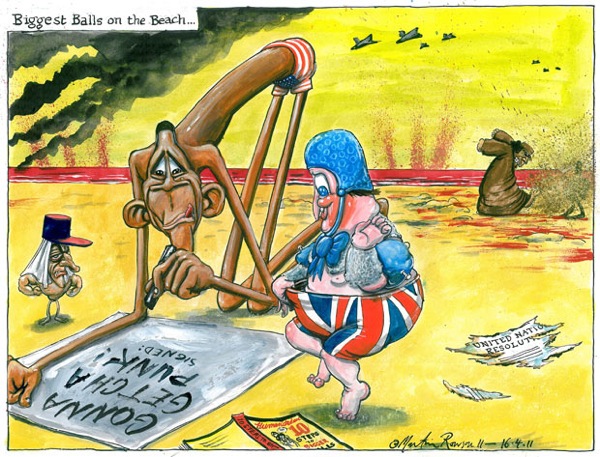
Despite the aerial bombardment of Colonel Gaddafi’s forces, the ragtag militia of the rebels do not have the training or the weaponry to withstand his forces which have now adapted measures to blunt the effectiveness of air raids–using human shields, riding in pickup trucks, using camouflage. About the rebels, a New York Times correspondent wrote:
… by almost all measures by which a military might be assessed, they are a hapless bunch. They have almost no communication equipment. There is no visible officer or noncommissioned officer corps. Their weapons are a mishmash of hastily acquired arms, which few of them know how to use.
Military chiefs on both sides of the Altantic had urged caution but France’s Nicholas Sarkozy to boost his domestic poll ratings and Britain’s David Cameron seeking some of the glory that Margaret Thatcher reaped from her victory over Argentina in the Malvinas conflict urged President Obama to support their ‘humanitarian intervention’ in Libya. Yet, there was never any clarity as to who the rebels were–as General Carter Ham, commander of the US Africa Command, told Congressional leaders and it appears that they represent coastal tribes of Cyrenaica while the tribes of the interior and the west continue their allegiance to Colonel Gaddafi.
Most notably, the objectives of the NATO mission in Libya are unclear or cannot be achieved merely by an air campaign. Its efforts have certainly postponed the defeat of the insurgents but without ground troops, it cannot oust the Colonel from power even though Sarkozy, Brown, and Obama have all called for his departure as the only acceptable solution. Note that this was not mandated by the UN Security Council resolution 1973 which sanctions the NATO operation and the resolution had explicitly forbidden ‘foreign occupation troops of any form.’ Yet, Britain, France, and Italy have all said they would send ‘unarmed military advisors‘–a prospect almost certain to involve deeper involvement: what would happen if these ‘unarmed’ advisors were targeted by the Libyan government forces as they surely are a legitimate military target?
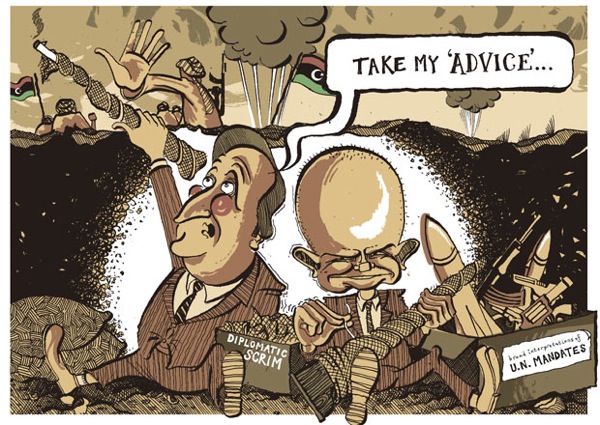
Insistence of the removal of Colonel Gaddafi from power rules out a negotiated settlement. A more likely prospect is that Libya will be partitioned into an eastern part which will effectively become a NATO protectorate with the bulk of Libya’s oil supplies. Neither France nor Britain has sufficient forces to keep pro-Gaddafi forces from attacking the Benghazi enclave–and it would require US boots on the ground–making the first African-American president of the US to be the first American president to invade and occupy an African state! After all, Khalifa Haftar who has been claiming to be the field commander of the rebel forces had been living near the CIA headquarters in Langley, Virginia for 20 years and they had provided him with a training camp.
The whole of Libya–east and west–would require massive reconstruction assistance given the damage done to its infrastructure by civil war and aerial bombardment. Who is going to fund this reconstruction? Is it ‘humanitarian to bomb the hell out of a country and then leave it in shambles? After all, the neo-conversatives claim that Iraq–which has far greater oil reserves–can pay for its own reconstruction remains hollow eight years after the US invasion.
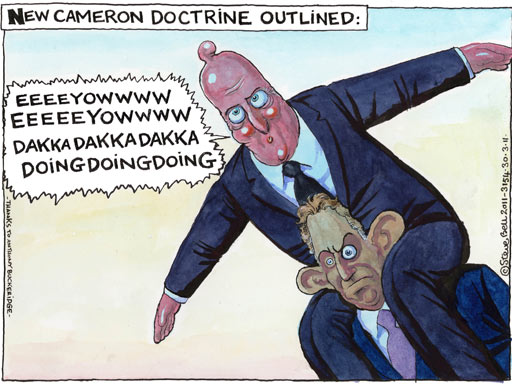
Even if the Gaddafi regime were to implode due to economic sanctions and the loss of the bulk of its oil revenues, his boast of arming every Libyan is likely to plunge the country into a prolonged phase of violent disruptions.
Libya and the Politics of Intervention
March 28, 2011 at 10:17 pm | Posted in Arms Control, Human Rights, International Relations, Nuclear Non-Proliferation, World Politics | 2 CommentsTags: Afghanistan, Africa, African Union, Bahrain, Brazil, Canada, China, Denmark, France, Germany, Global South, Holland, interstate system, Israel, Libya, Middle East, NATO, North Africa, Norway, Palestine, Persian Gulf, Russia, Spain, Uganda, United Kingdom, United States, US hegemony, Yemen
US-led attacks appear to have turned the tide against Colonel Muammer Gaddafi’s counter-revolution in Libya. Attacks by some 120 Tomahawk cruise missiles–each costing $575,000–and some eight days of air raids have established a ‘no-fly zone’ over Libya and US, French, British, Danish, Canadian, and other air forces have also targeted the Libyan government’s ground forces to deadly effect. The Libyan rebels, who had been virtually encircled in Benghazi have, as a result been able to roll back the government forces from Brega, Ras Lanuf, Ajdabiyia, and other towns in the east and are now attacking the town of Sirte, Gaddafi’s birth place.
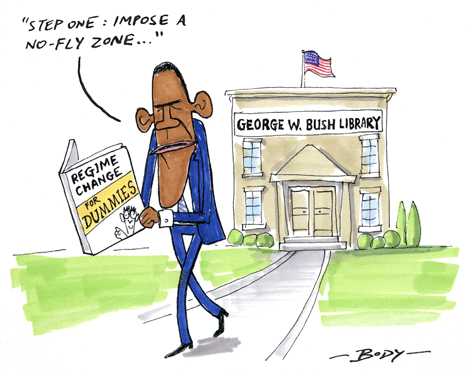
How are we to react to this exercise of Western military might against a state of the Global South? People like Gilbert Achcar and Juan Cole have vigorously defended the intervention in Libya. To them, the alternative would have been a brutal massacre of Gaddafi’s opponents by the better trained and equipped militias of the regime. For them, there were no other countervailing forces capable of intervening–not the African Union or Arab States. Western intervention was the only available option to stop a murderous dictator. It was sanctioned by the Arab League and the rebels themselves had pleaded for a ‘no-fly’ zone–a plea from a popular movement that could not be ignored. This was, a humanitarian intervention and not an attempt to secure access to Libya’s oil resources. After all, as Achcar points out, virtually all Western countries had oil companies operating in Libya already: “Italy’s ENI, Germany’s Wintershall, Britain’s BP, France’s Total and GDF Suez, US companies ConocoPhillips, Hess, and Occidental, British-Dutch Shell, Spain’s Repsol, Canada’s Suncor, Norway’s Statoil.”
There is of course the obvious objection: the West applies double standards, not only to Israel’s murderous assault on the Palestinians in Gaza but also to the brutal repression of protest movements in Bahrain and Yemen. As Richard Falk puts it:
How is this Libyan response different in character than the tactics relied upon by the regimes in Yemen and Bahrain, and in the face of far less of a threat to the status quo, and even that taking the form of political resistance, not military action. In Libya the opposition forces were relying almost from the outset on heavy weapons, while elsewhere in the region the people were in the streets in massive numbers, and mostly with no weapons, and in a few instances, with very primitive ones (stones, simple guns) that were used in retaliation for regime violence.
Indeed, almost from the very beginning of the protests, the rebels had taken arms and before Colonel Gaddafi’s forces launched a counter-assault, ragtag rebel militias had taken towns militarily from the regime’s gendarmes. Claiming that the regime was using African mercenaries, the rebels targeted anyone who looked “African’ including members of Libya’s African tribes because it is both an African and an Arab state.
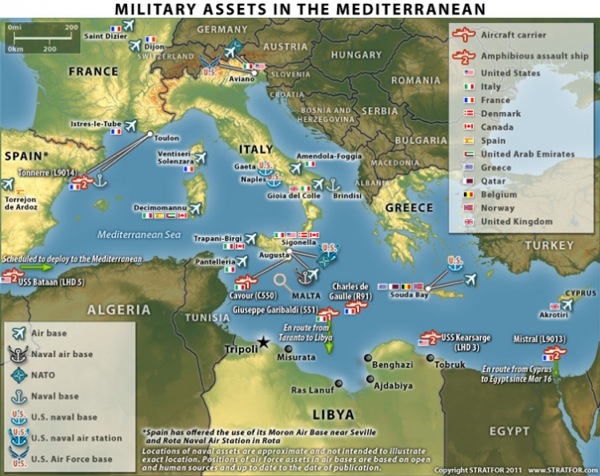
Analogies are often drawn to the situation in Rwanda but as the allusion to the African tribes in Libya suggests, no binary ethnic divide exists in Libya. There are many tribes and the confrontation between the regime and its opposition does not fracture along a single overriding ethnic divide and there is no genocidal intent in what is essentially a civil war between the regime and its opponents.
The character of the opposition also remains ambiguous–they include former members of the regime, local notables, radical Islamists, and eastern tribes opposed to western tribes. This was not the democratic movement that had swept autocrats from office in Tunisia and Egypt. The Arab League and the Gulf Cooperation Council may have supported the imposition of ‘no-fly’ zone but they do not speak for the Arab street and many of their members–Bahrain, Yemen–are actively engaged in brutally repressing democracy movements in their own states, and Saudi Arabia and other members of the Gulf Cooperation Council have intervened in Bahrain to help the al-Khalifa family crush its opponents.
The United Nations Security Council authorized the intervention–but only because the five members who abstained (Russia, China, India, Brazil, Germany) did not exercise their responsibilities. If they did not have enough information as the Indian delegate said–they should have abstained. The Russian Foreign Minister has subsequently said that the US-led air raids have far exceeded the Security Council’s authorization: this had been also raised by Amr Moussa, the Secretary General of the Arab League before he was pressured to retract his words.
Moreover, since Gaddafi has paid off many tribes, especially in the west, with oil revenues over the last 40 years, he has a solid core of support. What happens when the rebel forces attacks these population centers? Does the Security Council resolution to ‘protect the civilians’ not apply to them?
As also mentioned in an earlier post, if the regime follows through on its promise to arm its supporters, it could lead to a prolonged period of civil strife if Gaddafi is ousted as remnants of his supports could mount an armed resistance. This could lead to a new flow of African asylum-seekers to Europe. After all, as Achcar notes, a deal struck between Italy’s Silvio Berlusconi and Gaddafi reduced the flow of asylum-seekers to Italy from 36,000 in 2008 to a mere 4,300 in 2010. A prolonged stalemate or civil war in Libya, moreover as Vijay Prashad has written would constrain the West’s “ability to transit the oil that sits under its soil, and so dangerously harm the “way of life” of those who matter. Events had to be hastened.”
Intervention in Libya also raises a question: if Gaddafi had not abandoned his nuclear program in 2003, would the West have intervened in its civil war. Even though Gaddafi had sided with Idi Amin, President Yoweri Museveni of Uganda harshly criticizes “by now habit of the Western countries over-using their superiority in technology to impose war on less developed societies without impeachable logic. This will be the igniting of an arms race in the world.”
Finally, to the argument that there was no alternative to Western intervention in preventing a blood bath, the African Union had created an ad hoc commission to negotiate between the Libyan regime and its opponents but it was not allowed to begin its work on account of the air strikes and missile launches.
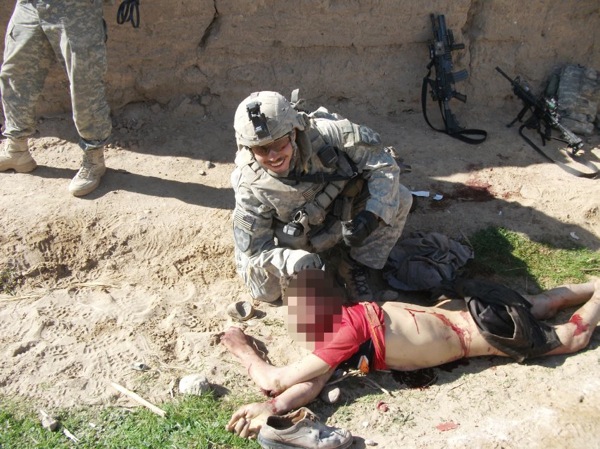
It is also perhaps worth wondering whether the United States which had been opposed to the French and British clamor for intervention, suddenly changed its mind just as Der Spiegel published photographs of grinning American troops posing with Afghan corpses–an event that got scant coverage in the event of the war against Libya. Otherwise, it may have got as much coverage as the atrocities in the Abu Gharib prison in Iraq. So much for humanitarian intervention!
Wikileaks, Iran, and the Middle East
December 10, 2010 at 3:24 pm | Posted in Arms Control, Human Rights, International Relations, Nuclear Non-Proliferation, World Politics | Leave a commentTags: international relations, interstate system, Iran, Israel, Middle East, Palestine, Saudi Arabia, US hegemony, world politics
Wikileaks–the largest unauthorized dump of diplomatic cables in history–has cast light into the shady world of diplomacy and in the Middle East revealed the deep animosity the rulers of Saudi Arabia have for the Iranian government. This is of course not news as the al-Ahram weekly noted but it did confirm to the Arab street how complicit their rulers are with the United States. It is not surprising that Saudi Arabia and other Persian Gulf states that had supported Saddam Hussein;s war against Iraq urged the US to strike against the Islamic Republic: “cut off the head of the snake,” the Saudi king Abdullah reportedly urged the Americans. And, King Hamad bin Isa al-Khalifa of Bahrain said that the United States should take out Iran’s nuclear capabilities “by whatever necessary.”
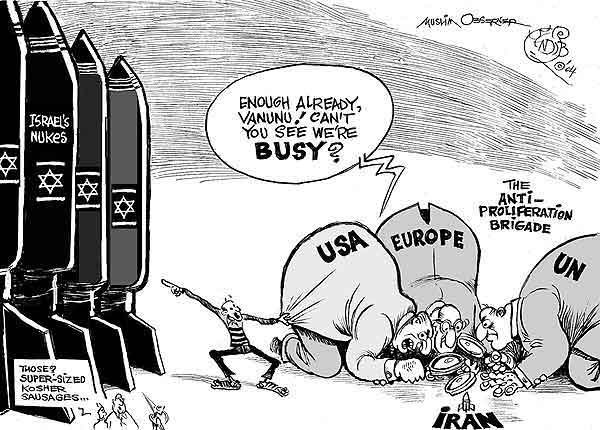
If the Obama Administration cite these and other remarks to justify a broad-based Arab opposition to Iran’s nuclear program, as Sharif Abdul Kouddous notes, none of these are democratic regimes and are propped up by American military, diplomatic, and financial support. The opposition to Iran expressed by these regimes was not reflected in the Arab Street. A Brookings Institute poll indicates a vast majority of the Arab population believe that the United States and israel are a greater threat to regional peace and political stability than Iran and they clearly recognize the double standards applied to Israel and Iran. Israel has over 200 nuclear warheads and faces no sanctions while Iran has not a single warhead, has said that it is not pursuing a nuclear weapons program, is facing increasingly stringent sanctions. The Wikileaks expose autocratic Arab rulers to be what they are: stooges dependent on the United States for their survival.
Moreover, as the media was focused on the information divulged by Wikileaks and the arrest of Julian Assange, the Obama Administration gave up trying to persuade the Israeli government to freeze settlement activity for 90 days so that the ‘peace talks’ with the Palestinian Authority could be resumed. They had concluded that even with a bribe of $3 billion dollars, the Israeli government was unwilling to cease constructing settlements in the Occupied Territories for a mere three months. As Andrew Bacevich notes, though the Israeli military power is unparalleled in the region, the continued offer of advanced US weaponry–as the offer of 20 F-35 aircraft for a nonrenewable 90-day freeze on settlement activity–continues to give credence to Israeli politicians’ claim that the security of the Jewish state is in jeopardy.
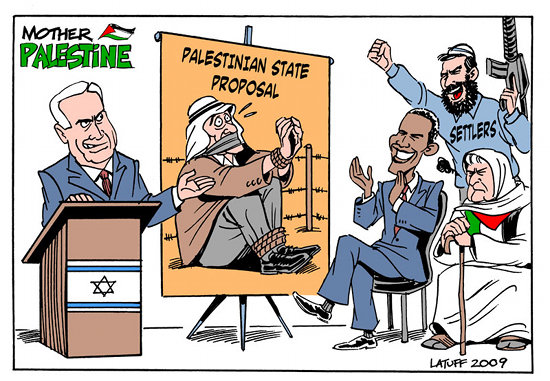
Bizarrely, as Palestinians dispatched firefighters to fight the Mount Carmel fire–the largest fire in Israel’s history–in early December 2010, Israeli soldiers were deployed near the Palestinian villages of Bil’in, Nil’in and Nabi Saleh, where Israelis, Palestinians, and international activists organize weekly non-violent protests against Israel’s 480-mile separation wall and its policy of settlements in the Occupied Territories. And the Israeli Ambassador to the United States, Michael B. Oren while acknowledging the contributions of the Palestinian fire-fighters chose to castigate the Palestinian leadership for not returning to the talks without mentioning the reasons for their refusal–the continued and unlawful expropriation of their land!

Indeed, Palestinian Authority President Mahmoud Abbas is in such an untenable situation with the Obama Administration urging him to continue to talk to the Israelis while the latter continue to gobble up Palestine and work to render any potential Palestinian state unviable, that he has threatened to extinguish “Palestinian self-rule” in the West Bank. This would imply that the Israelis will have to resume responsibility for the 2.2 million Palestinians as the military occupying power, a responsibility they had relinquished after the Oslo Accords and the creation of the Palestinian Authority in 1994. If this would cause chaos in the short-run as the Palestinian Authority employs some 150,000 people, it will put an end to a farcical situation and will undercut any legitimacy to these meaningless “peace process.” It would end too, all prospects of a two-state solution which of course was no solution at all.
Blog at WordPress.com.
Entries and comments feeds.
